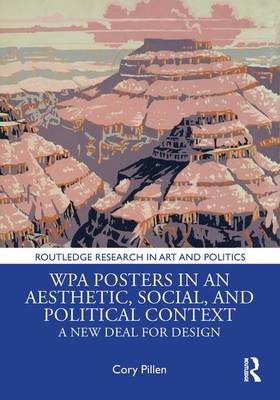
- Afhalen na 1 uur in een winkel met voorraad
- Gratis thuislevering in België vanaf € 30
- Ruim aanbod met 7 miljoen producten
- Afhalen na 1 uur in een winkel met voorraad
- Gratis thuislevering in België vanaf € 30
- Ruim aanbod met 7 miljoen producten
Omschrijving
This book examines posters produced by the Works Progress Administration (WPA), a federal relief program designed to create jobs in the United States during the Great Depression.
Cory Pillen focuses on several issues addressed repeatedly in the roughly 2,200 extant WPA posters created between 1935 and 1943: recreation and leisure, conservation, health and disease, and public housing. As the book shows, the posters promote specific forms of knowledge and literacy as solutions to contemporary social concerns. The varied issues these works engage and the ideals they endorse, however, would have resonated in complex ways with the posters' diverse viewing public, working both for and against the rhetoric of consensus employed by New Deal agencies in defining and managing the relationship between self and society in modern America.
This book will be of interest to scholars in design history, art history, and American studies.
Specificaties
Betrokkenen
- Auteur(s):
- Uitgeverij:
Inhoud
- Aantal bladzijden:
- 198
- Taal:
- Engels
- Reeks:
Eigenschappen
- Productcode (EAN):
- 9781138544338
- Verschijningsdatum:
- 16/03/2020
- Uitvoering:
- Hardcover
- Formaat:
- Genaaid
- Afmetingen:
- 178 mm x 246 mm
- Gewicht:
- 657 g

Alleen bij Standaard Boekhandel
Beoordelingen
We publiceren alleen reviews die voldoen aan de voorwaarden voor reviews. Bekijk onze voorwaarden voor reviews.











